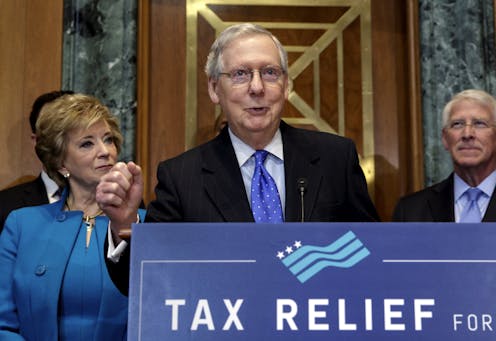The new tax bill will make Americans less healthy – and that's bad for the economy
If Americans become less healthy and have less access to health care, then everyone loses.

The new tax bill, passed by the Senate early Saturday, is not just about taxes. It has significant consequences for the American health care system – especially for the most vulnerable of our citizens.
If the proposed tax bill comes to fruition, it will reduce the affordability of health care for many Americans. Without access to care, our sickest and most vulnerable – especially the the poor and elderly – will suffer an increasing chance of poorer health outcomes.
What’s more, the bill’s long-term outcomes will be bad for our economy, resulting in lost productivity, lost wages and increased health care costs. If Americans become less healthy and have less access to health care, then everyone loses.
This bill puts much of the health system reforms under the Obama administration in jeopardy. For example, the Senate tax plan includes a repeal of an important part of the Affordable Care Act, the individual mandate. This provision requires that most Americans buy health insurance, or pay a penalty.
Many health care experts see the mandate as the only way to bring healthy people into the insurance marketplaces. Gutting the mandate would result in 13 million more uninsured Americans over the next 10 years.
Additionally, the Senate bill is expected to trigger a US$25 billion annual cut to Medicare, including cuts to cancer care for older Americans covered by Medicare. The House plan also eliminates medical expense deductions, implying that catastrophic expenses will not be as deductible under the new tax proposal.
Many economists believe that the American population has a right to be healthy and productive. This has major implications for the income generated for society. A healthier population has a greater investment in human capital and is more productive in the workforce, yielding greater output and income.
By the same token, a less healthy workforce will work less and be less valuable in the labor market. Health care costs will also increase due to uncompensated care, as more of the population cannot afford basic health care services to prevent disease – let alone chronic or critical care.
Lack of access to care also lowers the productivity of lower income citizens. If health insurance is less affordable and available, then those already at risk for illness will become even more vulnerable. This segment of the population will be likelier to fall ill and lose work time.
Is the right to health only relevant for those with influence or affluence in the U.S.? If so, then we all will pay for the poorer health of our society in the long term. Hospitals and other providers will pass along bad debt and costs associated with charity care for uninsured people. Insurance companies will charge higher premiums to cover the expenses they incur for treating patients who skip preventive care and instead go to the doctor only when they are sick.
As the most vulnerable Americans rack up increasing medical expenses and decline in productivity due to sickness, everyone in the U.S. will have to pay the price.
Diane Dewar does not work for, consult, own shares in or receive funding from any company or organization that would benefit from this article, and has disclosed no relevant affiliations beyond their academic appointment.
Read These Next
Hezbollah − degraded, weakened but not yet disarmed − destabilizes Lebanon once again
Hezbollah’s entry into the current war followed the killing of Ayatollah Ali Khamenei. The group has…
Congress once fought to limit a president’s war powers − more than 50 years later, its successors ar
At the tail end of the Vietnam War, Congress engaged in a breathtaking act of legislative assertion,…
When unpaid cooking, cleaning and child care get a dollar value, income inequality in the US shrinks
Women’s unpaid work at home has declined much more than men’s contributions have increased.






